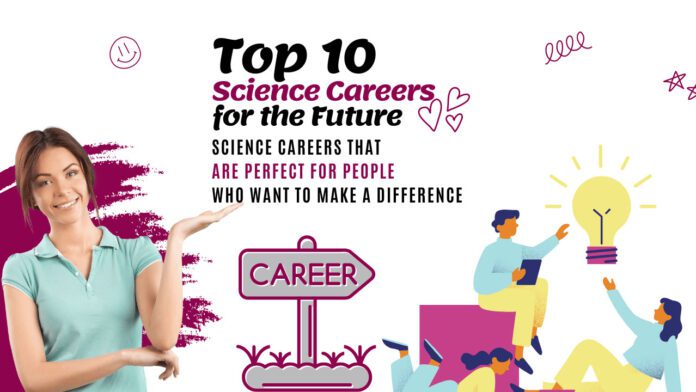Science is a vast and ever-evolving field, and with it comes a wide range of career opportunities. If you’re a science enthusiast with a passion for learning and discovery, then you may be wondering what science careers are in demand for the future.
Here are 10 of the top science careers for the future:
Table of Contents
Data Scientist :
Data scientists are in high demand as businesses and organizations look to make sense of the vast amounts of data they collect. Data scientists use their skills in mathematics, statistics, and programming to analyze data and identify trends. They then use this information to help businesses make better decisions.
Artificial Intelligence Engineer:
Artificial intelligence (AI) is rapidly changing the world, and AI engineers are in high demand to develop and implement AI technologies. AI engineers use their skills in computer science, mathematics, and statistics to create AI systems that can learn and make decisions on their own.
Bioengineer:
Bioengineers use their knowledge of biology, engineering, and mathematics to develop new technologies that can improve human health. Bioengineers work in a variety of fields, including medical devices, pharmaceuticals, and biotechnology.
Environmental Scientist:
Environmental scientists study the environment and its impact on human health. They use their knowledge to develop solutions to environmental problems, such as pollution and climate change. Environmental scientists work for government agencies, private companies, and non-profit organizations.
Geneticist:
Geneticists study genes and how they influence human health and behavior. They use their knowledge to develop new treatments for genetic diseases and to improve human health. Geneticists work in a variety of settings, including universities, hospitals, and pharmaceutical companies.
Materials Scientist:
Materials scientists study the properties of materials and how they can be used to create new products and technologies. Materials scientists work in a variety of industries, including aerospace, automotive, and electronics.
Pharmacologist:
Pharmacologists study the effects of drugs on the human body. They use their knowledge to develop new drugs and to improve the safety and effectiveness of existing drugs. Pharmacologists work in universities, hospitals, and pharmaceutical companies.
Physicist:
Physicists study the fundamental laws of nature. They use their knowledge to develop new technologies, such as lasers, nuclear power, and particle accelerators. Physicists work in universities, government agencies, and private companies.
Research Scientist:
Research scientists conduct research in a variety of fields, including biology, chemistry, physics, and engineering. They use their knowledge to develop new knowledge and to create new technologies. Research scientists work in universities, government agencies, and private companies.
Teacher:
Teachers play a vital role in educating the next generation of scientists. They use their knowledge and passion for science to inspire students and to help them develop the skills they need to succeed in science careers. Teachers work in elementary, middle, and high schools.
These are just a few of the many science careers that are in demand for the future. If you’re interested in a science career, there are many resources available to help you get started. You can talk to your teachers, counselors, and mentors. You can also visit websites and organizations that offer information and support for science careers.
Skills Needed for Science Careers:
The skills needed for science careers vary depending on the specific career, but some general skills that are important for all science careers include:
- Strong math and science skills
- Problem-solving skills
- Critical thinking skills
- Communication skills
- Teamwork skills
- Research skills
Top 10 Science Careers by Salary:
The following table lists the top 10 science careers by salary, according to the Bureau of Labor Statistics:
| Rank | Career | Median Annual Salary |
|---|---|---|
| 1 | Petroleum Engineer | $137,330 |
| 2 | Software Developer | $110,140 |
| 3 | Dentist | $164,010 |
| 4 | Physician | $208,000 |
| 5 | Pharmacist | $122,230 |
| 6 | Architect | $87,060 |
| 7 | Civil Engineer | $87,060 |
| 8 | Mechanical Engineer | $87,060 |
| 9 | Electrical Engineer | $87,060 |
| 10 | Industrial Engineer | $87,060 |
Top 10 Science Careers by Job Growth:
The following table lists the top 10 science careers by job growth, according to the Bureau of Labor Statistics:
| Rank | Career | Projected Job Growth from 2020 to 2030 |
|---|---|---|
| 1 | Software Developer | 22% |
| 2 | Nurse Practitioner | 25% |
| 3 | Physician Assistant | 31% |
| 4 | Actuary | 22% |
| 5 | Biomedical Engineer | 17% |
| 6 | Occupational Therapist | 18% |
| 7 | Physical Therapist | 16% |
| 8 | Registered Nurse | 15% |
| 9 | Veterinarian | 17% |
| 10 | Dental Hygienist | 17% |
With a passion for science and a willingness to work hard, you can achieve your dream of a science career.

